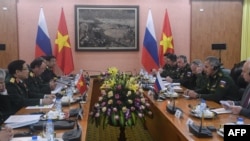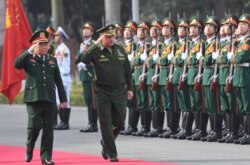Scholars in Asia say Vietnam's move this month to bolster defense ties with Russia will advance the Southeast Asian country’s pursuit of a multi-country foreign policy allowing it to depend on no single outside power.
The country that has been challenged by France, the United States and China within the past decade welcomes Russian assistance, Vietnamese state media outlets said after their Defense Minister Ngo Xuan Lich visited Moscow Feb. 5. “He therefore highlighted Vietnam’s consistent policy of enhancing the solidarity, friendship and comprehensive strategic cooperation with Russia, which is also the top priority in the foreign policy of the Vietnamese (Communist) Party, state and army,” party website Nhan Dan Online said.
That means Russia will keep Vietnam well armed and equipped with oil while acting as a counterweight against other big countries, analysts believe, in exchange for deals and more global military clout. The outcome matches Vietnam’s goal of getting along with all world powers without growing so cozy with any that it cannot stand on its own, they say.
"Vietnam has been in a very active process of trying to secure resources from many countries including Russia, including Japan, to demonstrate that it’s not building a singular alliance, but rather it’s trying to diversify its relationships,” said Stephen Nagy, a senior associate professor of politics and international studies at International Christian University in Tokyo.
Balancing act
Vietnam is also exploring closer relations with the United States despite bitter wartime memories going back to the 1960s but not as fast as Washington would like, Nagy said. China, as Vietnam’s communist neighbor, maintains close political ties as well as $100 billion plus in annual trade, but Vietnamese resent China after a border war in 1979 and because Chinese forces today control tracts of the South China Sea that Vietnam also claims.
Russia happens to be pushing for better relations around Asia. It’s expected to look for buyers of arms and oil -- its two specialties -- while staying relevant globally. Sanctions by the U.S. and European Union government after Russia’s 2014 annexation of Crimea have hurt pieces of the Russian economy.
"The general sentiment in this region is that Russia is seen as an alternative partner when it comes to the Sino-U.S. rivalry,” said Collin Koh, maritime security research fellow at Nanyang Technological University in Singapore. “So, Russia is one of those other alternative choices that you can turn to if you want to get away from the Sino-U.S. competition."
Vietnam already trusts Russia as a helpful yet non-invasive partner going back more than 50 years.
The ex-Soviet Union helped Vietnam’s communists win their war against the United States by offering guns, tanks and rocket launchers. The same country paid $1 billion per year from 1978 into the 1980s for post-war reconstruction, news website Rossiyskaya Gazeta says. From 2011 to 2014, Vietnam used Russian technology and know-how to reopen an old base at Cam Ranh Bay as a maintenance center for foreign warships.
Counterweight to China
Russia aligns with China in world affairs -- from skepticism of U.S. foreign policy to approaches toward crises the Middle East. But Russia’s stronger armed forces and its commercial ambitions, especially the search for oil under the South China Sea, put Beijing ill at ease.
China chafes especially when outside powers enter the South China Sea. China calls 90% of the tropical waterway its own despite rival claims by five other Asian governments including Vietnam. China has stepped up control of the waterway since 2010 by using its stronger military and technology.
China and Russia don’t usually talk about it, but “the Russia-Vietnam cooperation in the South China Sea and on security issues, it’s a pretty big issue,” said Sun Yun, East Asia Program senior associate at the Stimson Center think tank in Washington.
In 2018, Russian oil developer Rosneft started drilling in two South China Sea sites authorized by Vietnam, ruffling China. In April last year, a Russian helicopter contractor started operating a maintenance facility in Vietnam. Vietnam gets at least 85% of its military equipment from Russia now, said Carl Thayer, emeritus professor with the University of New South Wales in Australia.
"Russia’s been exempted from protocols when they want to make a ship visit to Vietnam,” he said. “All they have to do is notify Vietnam they intend to stop -- they don’t need a visa type thing,” Thayer said.
More on the way
Vietnam’s defense minister signed a joint vision statement in Moscow with Russian counterpart Sergei Shoigu. The two sides will step up exchanges of views on issues of mutual concern, the Vietnamese government's VGP News said.
Expect Russia to push for more arms sales and oil exploration contracts going forward, Sun said.
Hanoi as 2020 chair of the 10-member Association of Southeast Asian Nations (ASEAN) will expand on goodwill cemented this month by integrating Russia more into the region’s broader ambitions, Vietnamese media outlets reported. The bloc focuses heavily on counter-terrorism work and does occasional joint military drills. It’s negotiating with China to reach agreement on a code of conduct that would prevent mishaps in the disputed sea.
"Vietnam will … back Russia’s efforts in expanding cooperation with ASEAN, for peace, stability and development,” Nhan Dan Online said.





